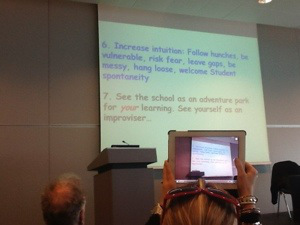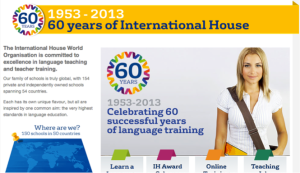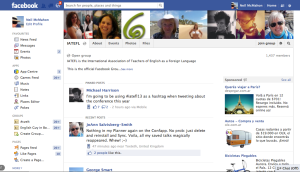Starting this on the bus on the way home from the centre of town,

The 39 bus – from Corrientes to Carranza
and no doubt won’t finish it til tomorrow morning, but wanted to try out making a post on my phone – after all, this is where our learners are headed, isn’t it?
Sandy has been a big help again today, easily my star of the conference.

‘We’ ‘saw’ the following talks together:
Does the word “synonym” have a synonym? – Leo Selivan
Bridging the gap by Ceri Jones
From preparation to preparedness – Adrian Underhill and Alan Maley
Does the word “synonym” have a synonym? – Leo Selivan
talk sounds fascinating, I love travelling back through the history of the language as he did at the beginning of his talk and this pie chart of the make up of English I haven’t seen before:

Where does English come from?
And for some strange reason I always enjoy telling my students that English is the biggest language in the world (for some other strange reason my Argentine students never believe me and insist Spanish has more words, not a problem I ever had in the Czech Republic).
And of course, the main point Leo makes about synonyms is crucial when it comes to vocab learning (well-timed, since I’m doing our CELTA session on teaching vocab this afternoon – one of my favourites) – synonyms are not the same. This is something I’m a staunch defender of and always pick up our trainees on when they say ‘they’re the same’ to the students in class (a little demand high CELTA tutoring there, Neil?). If they were the same then we wouldn’t have two words for something. The reason we do have two words for something, or three or four, is because there are subtle differences between them (perhaps because the different social or geographic classes saw things differently back when the language was being molded (hang on a minute, language is always being molded (although perhaps nowadays it’s being moulded too?)). And so they don;t differ in basic meaning, but as Leo points out, they differ in their collocations, register, colligations and semantic prosodies, to name but a few. And this does need to be pointed out to students, as I will point out to our CELTees this afternoon.
Sandy reports only two practical ideas from Leo, collocation forks, which if I understand correctly go back to Lewis’ ideas in The Lexical Approach, and a website called Just the word, which looks like a useful reference page for teachers and students alike – demand high of yourselves by checking out collocations of words before you teach them (but remember to stay in the context in which you’re teaching). My example nods to yesterday’s post about Day One at IATEFL:
I do like the visula simplicity of the little green bars, though I’m struggling to see why ‘cabbage at’ is just as used as ‘cabbage with’. Market forces I imagine.
Bridging the gap by Ceri Jones
is getting short shrift because I have some Academic Coordinating to do before pilates class, but seems worth a mention because the course book she is selling in the talk seems to be written on slightly more solid foundations than any others in recent years. It seems to take into account the changing world and changing language around us and tries to be more relevant to learners by including them more in activities. I imagine like most talks about course books she focused on the three best activities in the book, but hopefully that’s just me being cynical. Definitely one to check out when it comes to choosing new books. One activity she mentions that I am a big fan of is getting the learners to write a text before they read a similar text form the coursebook, they are then immediately comparing their own ideas and writing skills with those of the author, which makes the whole process more cognitive and affective.
From preparation to preparedness – Adrian Underhill and Alan Maley
This was one of the most eagerly awaited (and tweeted sessions) of the day and I picked up on the following:
This just made me want to be at the conference and at the session. Whether or not the presenters were giving us good ideas, I’d love to have been there to see them try.
And this tweet makes me want to read these articles. We should all be expecting the unexpected in our lessons – and enjoying it! One of the things I loved most about our recent Delta Intensive was watching very good teachers (when the lesson went to plan) become even better teachers by changing the plan, adapting the plan and losing the plan depending on their students’ needs.
But unfortunately there weren’t too many practical ideas coming out of the session, except for this list:

Training teachers to improvise

Improvising teachers
Those last two are the ones I’m going to focus on more, since the others are hopefully already ‘just good teaching’, aren’t they?
Time to coordinate, so I’ll leave you with a few random thoughts on a few random tweets I favourited throughout the day:
Completely agree with this one, Mike. I always try and set my self a new development goal each year (and normally manage many more along the way). This year’s include blogging IATEFL :), writing a Delta Module One Live Online course and celebrating IH World’s 60th anniversary (hope you enjoy the free gifts, since many of them are from me).
This tweet too sounds like the kind of session I enjoy – practical activities that really work in the classroom. How many were there? What were they? Do they really promote further fluency? How can I find out?
I include this tweet because I don’t really get it. Apart from people actually paying less attention to the speaker during conversations because they are distracted by their phones (although at conferences we probably concentrate more when we are tweeting / blogging during the talks?), speech itself isn’t changing, so how does the speaker envisage speaking activities reflect the more digital communication that there is? Anyone who was there care to enlighten me?
This link sounded good so I’m sharing it with you. Obviously I was intrigued by the Dogme / Demand High mix (’twas only a matter of time) so let’s see what it’s all about shall we? Not much D&D (un)fortunately, so little in fact I had to comment on it:
Hi Tom,
Very common sense if your students have the technology – sounds just like my kind of lesson and similar to one I shared yesterday in its use of whatever tech is ‘handy’.
Am interested in hearing how you made it Demand High though, since that doesn’t come out of your post and those dominoes don’t sound very Dogme (not that that’s a criticism).
But I hope your title and tags brought you a few new readers like myself anyhow  .
.
https://twitter.com/harrisonmike/status/321662458794221569
I’m a big fan of Wily’s and would love to have been at his talk – he really is an authentic teacher and always makes you think. If I have time I’ll try and get more of a taste of his and Katy Davies’ talks to comment on tomorrow, because they sound like to of the talks of the day.
Work beckons. What do you reckon?


















Day two at #iatefl from a downtown BsAs bus
10 04 2013Starting this on the bus on the way home from the centre of town,
The 39 bus – from Corrientes to Carranza
and no doubt won’t finish it til tomorrow morning, but wanted to try out making a post on my phone – after all, this is where our learners are headed, isn’t it?
Sandy has been a big help again today, easily my star of the conference.
‘We’ ‘saw’ the following talks together:
Does the word “synonym” have a synonym? – Leo Selivan
Bridging the gap by Ceri Jones
From preparation to preparedness – Adrian Underhill and Alan Maley
Does the word “synonym” have a synonym? – Leo Selivan
talk sounds fascinating, I love travelling back through the history of the language as he did at the beginning of his talk and this pie chart of the make up of English I haven’t seen before:
Where does English come from?
And for some strange reason I always enjoy telling my students that English is the biggest language in the world (for some other strange reason my Argentine students never believe me and insist Spanish has more words, not a problem I ever had in the Czech Republic).
And of course, the main point Leo makes about synonyms is crucial when it comes to vocab learning (well-timed, since I’m doing our CELTA session on teaching vocab this afternoon – one of my favourites) – synonyms are not the same. This is something I’m a staunch defender of and always pick up our trainees on when they say ‘they’re the same’ to the students in class (a little demand high CELTA tutoring there, Neil?). If they were the same then we wouldn’t have two words for something. The reason we do have two words for something, or three or four, is because there are subtle differences between them (perhaps because the different social or geographic classes saw things differently back when the language was being molded (hang on a minute, language is always being molded (although perhaps nowadays it’s being moulded too?)). And so they don;t differ in basic meaning, but as Leo points out, they differ in their collocations, register, colligations and semantic prosodies, to name but a few. And this does need to be pointed out to students, as I will point out to our CELTees this afternoon.
Sandy reports only two practical ideas from Leo, collocation forks, which if I understand correctly go back to Lewis’ ideas in The Lexical Approach, and a website called Just the word, which looks like a useful reference page for teachers and students alike – demand high of yourselves by checking out collocations of words before you teach them (but remember to stay in the context in which you’re teaching). My example nods to yesterday’s post about Day One at IATEFL:
http://www.just-the-word.com
I do like the visula simplicity of the little green bars, though I’m struggling to see why ‘cabbage at’ is just as used as ‘cabbage with’. Market forces I imagine.
Bridging the gap by Ceri Jones
is getting short shrift because I have some Academic Coordinating to do before pilates class, but seems worth a mention because the course book she is selling in the talk seems to be written on slightly more solid foundations than any others in recent years. It seems to take into account the changing world and changing language around us and tries to be more relevant to learners by including them more in activities. I imagine like most talks about course books she focused on the three best activities in the book, but hopefully that’s just me being cynical. Definitely one to check out when it comes to choosing new books. One activity she mentions that I am a big fan of is getting the learners to write a text before they read a similar text form the coursebook, they are then immediately comparing their own ideas and writing skills with those of the author, which makes the whole process more cognitive and affective.
From preparation to preparedness – Adrian Underhill and Alan Maley
This was one of the most eagerly awaited (and tweeted sessions) of the day and I picked up on the following:
This just made me want to be at the conference and at the session. Whether or not the presenters were giving us good ideas, I’d love to have been there to see them try.
And this tweet makes me want to read these articles. We should all be expecting the unexpected in our lessons – and enjoying it! One of the things I loved most about our recent Delta Intensive was watching very good teachers (when the lesson went to plan) become even better teachers by changing the plan, adapting the plan and losing the plan depending on their students’ needs.
But unfortunately there weren’t too many practical ideas coming out of the session, except for this list:
Training teachers to improvise
Improvising teachers
Those last two are the ones I’m going to focus on more, since the others are hopefully already ‘just good teaching’, aren’t they?
Time to coordinate, so I’ll leave you with a few random thoughts on a few random tweets I favourited throughout the day:
Completely agree with this one, Mike. I always try and set my self a new development goal each year (and normally manage many more along the way). This year’s include blogging IATEFL :), writing a Delta Module One Live Online course and celebrating IH World’s 60th anniversary (hope you enjoy the free gifts, since many of them are from me).
This tweet too sounds like the kind of session I enjoy – practical activities that really work in the classroom. How many were there? What were they? Do they really promote further fluency? How can I find out?
I include this tweet because I don’t really get it. Apart from people actually paying less attention to the speaker during conversations because they are distracted by their phones (although at conferences we probably concentrate more when we are tweeting / blogging during the talks?), speech itself isn’t changing, so how does the speaker envisage speaking activities reflect the more digital communication that there is? Anyone who was there care to enlighten me?
This link sounded good so I’m sharing it with you. Obviously I was intrigued by the Dogme / Demand High mix (’twas only a matter of time) so let’s see what it’s all about shall we? Not much D&D (un)fortunately, so little in fact I had to comment on it:
Hi Tom, .
.
Very common sense if your students have the technology – sounds just like my kind of lesson and similar to one I shared yesterday in its use of whatever tech is ‘handy’.
Am interested in hearing how you made it Demand High though, since that doesn’t come out of your post and those dominoes don’t sound very Dogme (not that that’s a criticism).
But I hope your title and tags brought you a few new readers like myself anyhow
https://twitter.com/harrisonmike/status/321662458794221569
I’m a big fan of Wily’s and would love to have been at his talk – he really is an authentic teacher and always makes you think. If I have time I’ll try and get more of a taste of his and Katy Davies’ talks to comment on tomorrow, because they sound like to of the talks of the day.
Work beckons. What do you reckon?
Comments : 8 Comments »
Tags: 2013, activities, Buenos Aires, CELTA, comment, CPD, Delta Modules, Demand High, Dogme, ELT, handout, IH, International House, lesson plans, Neil McMahon, Share, Speaking, Students, tweet, workshop
Categories : Developing Teachers, My CPD and I